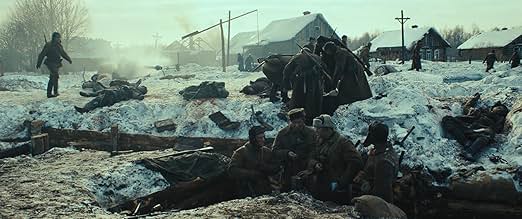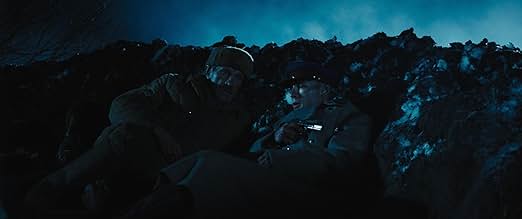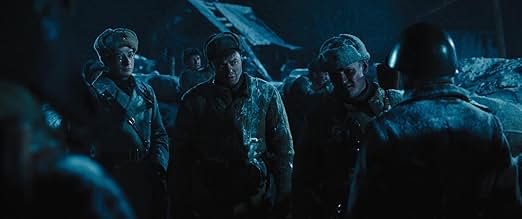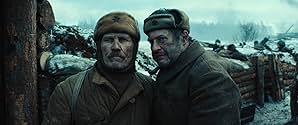Rzhev
- 2019
- 1h 53min
CALIFICACIÓN DE IMDb
6.1/10
1.4 k
TU CALIFICACIÓN
En el invierno de 1942 cerca de la ciudad de Rzhev se dieron batallas no muy conocidas, pero sangrientas, y recibieron el nombre de "Picadora de carne de Rzhev". La película está basada en l... Leer todoEn el invierno de 1942 cerca de la ciudad de Rzhev se dieron batallas no muy conocidas, pero sangrientas, y recibieron el nombre de "Picadora de carne de Rzhev". La película está basada en la premiada novela de Vyacheslav Kondratyev.En el invierno de 1942 cerca de la ciudad de Rzhev se dieron batallas no muy conocidas, pero sangrientas, y recibieron el nombre de "Picadora de carne de Rzhev". La película está basada en la premiada novela de Vyacheslav Kondratyev.
- Dirección
- Guionistas
- Elenco
- Premios
- 1 nominación en total
Daniil Voropaev
- Sgt. Lavrov
- (as Danila Voropaev)
- Dirección
- Guionistas
- Todo el elenco y el equipo
- Producción, taquilla y más en IMDbPro
Opiniones destacadas
Don't look at the ratings and comments here. It's a nice experience, the movie captured me the whole time. You won't regret watching it.
No pun intended, really not meant to offend anyone either. You are literally thrown into the second world war though. There is no romantic sentiment or anything close to that in here. Yes the Russians are being shown as heroes and as strong as you can imagine. That being said, try not to compare that situation with what is going on right now in Ukraine.
I may be a bit too nice describing the current situation. But that is not about that, it is about the horror of war. And what it sometimes takes to win - even if it may not always feel that way. And that even the smallest victories can have a big impact. If you are what they call a history buff, you will know what I mean - or after you watch the movie it will become apparent too. A lot of violence obviously, but that is what happens during war - this does not hold back on anything.
I may be a bit too nice describing the current situation. But that is not about that, it is about the horror of war. And what it sometimes takes to win - even if it may not always feel that way. And that even the smallest victories can have a big impact. If you are what they call a history buff, you will know what I mean - or after you watch the movie it will become apparent too. A lot of violence obviously, but that is what happens during war - this does not hold back on anything.
The opening battle scene was good but suffered from war movie clichés, like having a guy drag another to safety only to find half his body missing. They also have those stock characters, the scavenger, the harsh Commissar, and the heroic, square jawed commander. But as the movie progresses, the actors settle into their roles. The commander is especially likable.
The movie is well structured. After the opening battle there is a tense pause before the German counter-attack. This gives the actors time to show us the state or the Red Army in 1942. We see the tension between the regular army and the Commissars. All war movies glam up battle scenes but it was less than a typical American production.
The behavior of the Commissars is portrayed negatively but we hear enough to understand why they identify so strongly with the state. This does not justify them but it lets you see them as humans who took a wrong turn. The Commissars have logical, if flawed, reasons for their decisions as their heavy handedness creates hostility. After a tense argument, a Commissar refuses to send help to a unit that just took a position, blurting out, 'whatever we send them will be a total loss'. He assumes the officer is being emotional but he is not allowing the army to prove what they could do given resources at critical times. I thought this interplay was well done but you have to look for it, this good writing.
They used the church imagery effectively. You see it wherever they went. You see them standing next to a wall decorated with icons and in a basement. Religious themes can feel forced but here it felt natural. Even the Commissars, famous for their atheism, chose to ignore its presence rather than fight it. You could see this going through their minds with one uncomfortable glance. The Church belonged there the Germans did not. When a German emerged from an Orthodox church at night with a flame thrower, it was chilling. It was as if they were assaulting the essence of the town.
The Germans were a better foil here than in American movies. In U. S. movies they are portrayed as evil but incompetent. This detracts from their seriousness. Here they are deadly and their presence is like a dark cloud.
Except for a few common war movie tropes, this was a very good movie.
The movie is well structured. After the opening battle there is a tense pause before the German counter-attack. This gives the actors time to show us the state or the Red Army in 1942. We see the tension between the regular army and the Commissars. All war movies glam up battle scenes but it was less than a typical American production.
The behavior of the Commissars is portrayed negatively but we hear enough to understand why they identify so strongly with the state. This does not justify them but it lets you see them as humans who took a wrong turn. The Commissars have logical, if flawed, reasons for their decisions as their heavy handedness creates hostility. After a tense argument, a Commissar refuses to send help to a unit that just took a position, blurting out, 'whatever we send them will be a total loss'. He assumes the officer is being emotional but he is not allowing the army to prove what they could do given resources at critical times. I thought this interplay was well done but you have to look for it, this good writing.
They used the church imagery effectively. You see it wherever they went. You see them standing next to a wall decorated with icons and in a basement. Religious themes can feel forced but here it felt natural. Even the Commissars, famous for their atheism, chose to ignore its presence rather than fight it. You could see this going through their minds with one uncomfortable glance. The Church belonged there the Germans did not. When a German emerged from an Orthodox church at night with a flame thrower, it was chilling. It was as if they were assaulting the essence of the town.
The Germans were a better foil here than in American movies. In U. S. movies they are portrayed as evil but incompetent. This detracts from their seriousness. Here they are deadly and their presence is like a dark cloud.
Except for a few common war movie tropes, this was a very good movie.
At last a real good Russian war movie, about the Great Patriotic War, a subject rarely close to real, actual events. There are batches of garbage propaganda stuff, where the Germans are always shown as idiots - idiots who provoked more than 25 millions deaths among the Russian population.....Here, the focus is on the Political Commisars, the Politrouks, who killed anyone who hesitated to fight. This point of view was rarely spoken in Russian movies. In this film, the enemy is maybe more them than the Germans. Political commissars and their bloodthirsty decisions, who ordered the deaths of thousands of soldiers only to take a simple hill. For Staline and his gang, the human life of their own fellows was nothing. They were more than Germans; one Nazi for one hundred Russians. An unbalanced fight. I have always found weird and not logical that people defending their life, freedom and homeland - the Russians - needed Political commissars to prevent them to desert.....The Nazis did not in Russia; maybe for obvious reasosn though. Where a deserter would have been, among the "Untermenschen", slavic "under men'; they were safer in the middle of their own "kameraden'...So, to summarize, I highly recommend this feature.
I have no idea why the 5.8 score exists for this film. It truly is bewildering. Apparently the people scoring this film low are either Soviet sympathizers, Nazi sympathizers, or hate realistic war films?
I don't know. The low score makes no sense to me.
What does make sense to me is that director Igor Kopylov crafts a fine film around one of the many pivotal battles that helped shape Russia's eventual victory over the Germans leading up to the battle of Stalingrad.
Ovsyannikovo was one of the many small strategic points in the battlefield that the Soviets needed to capture to push the Germans out. The film itself is just a small look at the many lives lost trying to capture and secure this small village.
The film does a fine job of not shying away from the brutal and sadistic nature of the Germans to secure victory (massacring and raping civilians) and then systematically wiping out opposing forces.
The film also does a fine job of making it known that some of the biggest hurdles the Russian army faced in the war was from Soviet leadership!
The bureaucracy and stupidity of the Soviets cost many great and brave men their lives. A central sub-plot to the film outlines how the already thinning company would lose additional soldiers over the most trivial and banal of things.
But this is what happened, and this is why so many Russians died during World War II (and thereafter during the reign of the Soviet Union).
As far story structure is concerned, the film mostly only centers around the men stationed Ovsyannikovo, with a few snippets of the commanding officers trying to justify their logic in not sending reinforcements or properly aiding their soldiers. I almost wanted to spit into the face of the commanders wasting he lives of these brave soldiers; that's just how engrossing the film had become.
But what's more is that all of this feels authentic. Kopylov makes the battles feel grounded and realistic for the most part, and some soldiers suffer shell shock, PTSD, delirium and panic attacks, just as you would expect under those conditions. The violence is also fairly visceral and realistic; the special effects team make use of both squibbing and CGI, so while those of you who may hate the look of CGI blood, there is still some squibbing effects that help highlight the realism of the gun battles.
Overall, it's a fascinating watch. Of course it's not as over-the-top and action-packed as T-34, but it is very similar to Kim Druzhinin and Andrey Shalopa's tightly hewn war-thriller, Panfilov's 28. Ignore the low rating, I'm not sure what's going on with that, but if you can find a way to view this film definitely give it a watch.
I don't know. The low score makes no sense to me.
What does make sense to me is that director Igor Kopylov crafts a fine film around one of the many pivotal battles that helped shape Russia's eventual victory over the Germans leading up to the battle of Stalingrad.
Ovsyannikovo was one of the many small strategic points in the battlefield that the Soviets needed to capture to push the Germans out. The film itself is just a small look at the many lives lost trying to capture and secure this small village.
The film does a fine job of not shying away from the brutal and sadistic nature of the Germans to secure victory (massacring and raping civilians) and then systematically wiping out opposing forces.
The film also does a fine job of making it known that some of the biggest hurdles the Russian army faced in the war was from Soviet leadership!
The bureaucracy and stupidity of the Soviets cost many great and brave men their lives. A central sub-plot to the film outlines how the already thinning company would lose additional soldiers over the most trivial and banal of things.
But this is what happened, and this is why so many Russians died during World War II (and thereafter during the reign of the Soviet Union).
As far story structure is concerned, the film mostly only centers around the men stationed Ovsyannikovo, with a few snippets of the commanding officers trying to justify their logic in not sending reinforcements or properly aiding their soldiers. I almost wanted to spit into the face of the commanders wasting he lives of these brave soldiers; that's just how engrossing the film had become.
But what's more is that all of this feels authentic. Kopylov makes the battles feel grounded and realistic for the most part, and some soldiers suffer shell shock, PTSD, delirium and panic attacks, just as you would expect under those conditions. The violence is also fairly visceral and realistic; the special effects team make use of both squibbing and CGI, so while those of you who may hate the look of CGI blood, there is still some squibbing effects that help highlight the realism of the gun battles.
Overall, it's a fascinating watch. Of course it's not as over-the-top and action-packed as T-34, but it is very similar to Kim Druzhinin and Andrey Shalopa's tightly hewn war-thriller, Panfilov's 28. Ignore the low rating, I'm not sure what's going on with that, but if you can find a way to view this film definitely give it a watch.
¿Sabías que…?
- TriviaDuring the last battle a jet trail can be seen in the sky
Selecciones populares
Inicia sesión para calificar y agrega a la lista de videos para obtener recomendaciones personalizadas
- How long is Rzhev?Con tecnología de Alexa
Detalles
- Fecha de lanzamiento
- País de origen
- Idioma
- También se conoce como
- 1942: Unknown Battle
- Productoras
- Ver más créditos de la compañía en IMDbPro
Taquilla
- Total a nivel mundial
- USD 1,401,156
- Tiempo de ejecución
- 1h 53min(113 min)
- Color
Contribuir a esta página
Sugiere una edición o agrega el contenido que falta
























